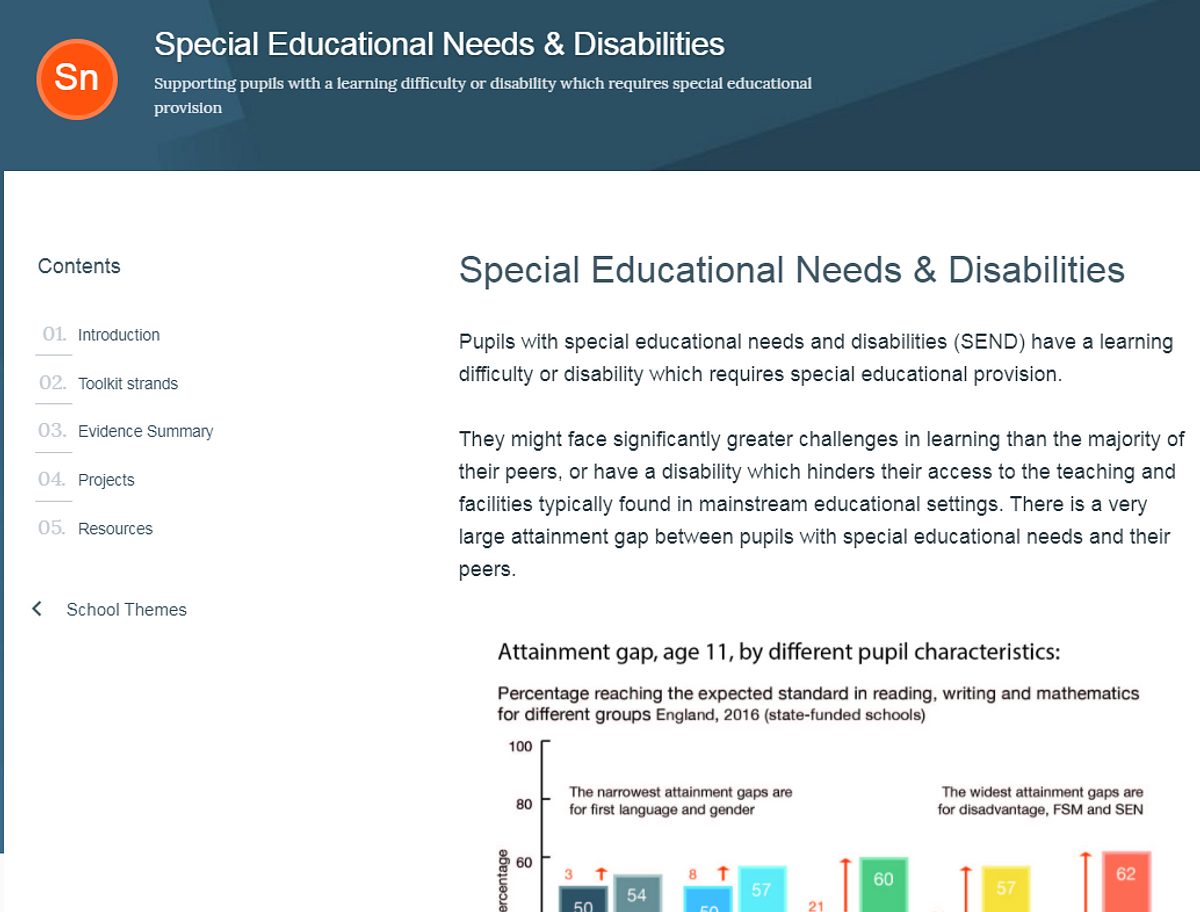This week, we’ve published a new strand in ‘The Big Picture’ – our one-stop shop for EEF resources – focusing on relevant messages for the support of pupils with special educational needs and disabilities (SEND)

Here, Programme Manager Peter Henderson highlights our top messages to school leaders and SENDCos (Special Educational Needs and Disabilities Coordinators) in mainstream settings…
What are the EEF’s top three messages to school leaders when considering provision for pupils with SEND?
1. Ensure that your deployment of teaching assistants is effective
The research evidence on the deployment of teaching assistants (TAs) suggests that they can have a wide range of impacts. One large UK study (2010) found that, on average, pupils in mainstream schools receiving the most support from TAs made less progress than similar pupils who received little or no TA support. As a result, pupils with the highest levels of SEND, who received the most TA support, therefore experienced the greatest negative impacts. Ensuring appropriate deployment and training of teaching assistants is, therefore, essential for securing positive outcomes for pupils with SEND.
The EEF has funded a number of trials which suggest that TAs can have positive impacts if they are appropriately deployed with sufficient training and support. Alongside colleagues at the UCL Institute of Education we used this evidence to create the EEF guidance report, Making Best Use of Teaching Assistants, which contains seven evidence-based recommendations to maximise the effectiveness of TAs
Ensuring appropriate deployment and training of teaching assistants is essential for securing positive outcomes for pupils with SEND.
We hope that the recommendations in this guidance can ensure that the best teaching is provided to those pupils with the greatest need.
2. Consult the EEF’s guidance reports on literacy and mathematics
EEF guidance reports review the best available evidence on effective teaching and make actionable recommendations for practice. They offer a practical guide for high-quality teaching for all pupils, including those with SEND, as well as a starting point for more intensive support for pupils who are not making good progress.
We still do not know whether children with more severe or more specific learning difficulties in maths or literacy require fundamentally different types of interventions. If pupils are really struggling, the most effective response is to gain a good understanding of what they are struggling with and why, and then respond with evidence-based teaching and interventions
The recommendations in our maths and literacy guidance, when combined with careful consideration of a student’s needs and sound professional judgement, provide a good basis that supports all pupils to improve, regardless of their starting point.
3. Deploy high-quality, structured interventions to support pupils to make progress
Any intervention is likely to be ineffective if it is not carefully matched to pupils’ needs. Effective identification of need is an essential first step.
Effective identification of need is an essential first step.
Once pupils’ needs are identified, it may be that they require intervention support. One way to identify high-quality interventions is to look for those that have been rigorously evaluated and have had a positive impact on pupil outcomes. The EEF’s list of Promising Projects and the Institute for Effective Education’s Evidence4Impact database are useful repositories of the evidence on interventions.
This evidence base is improving, but still patchy, and an ‘off-the-shelf’ intervention with a rigorous and positive evaluation might not be appropriate or available.
Schools may take the different approach of adopting, or creating, an intervention with the features common to other successful interventions. See our guidance reports on maths, literacy and TAs for more on successful interventions in these areas.
These are just a few key messages from our research so far, and there is a lot more evidence on SEND out there. However, there are also many gaps in the evidence base and there is much more to learn.
We are keen to continue funding research on the issue (see our recent trials of MITA and Achievement for All for examples of projects with relevance to SEND) and look forward to producing future guidance on how senior leaders can most effectively support pupils with SEND.
